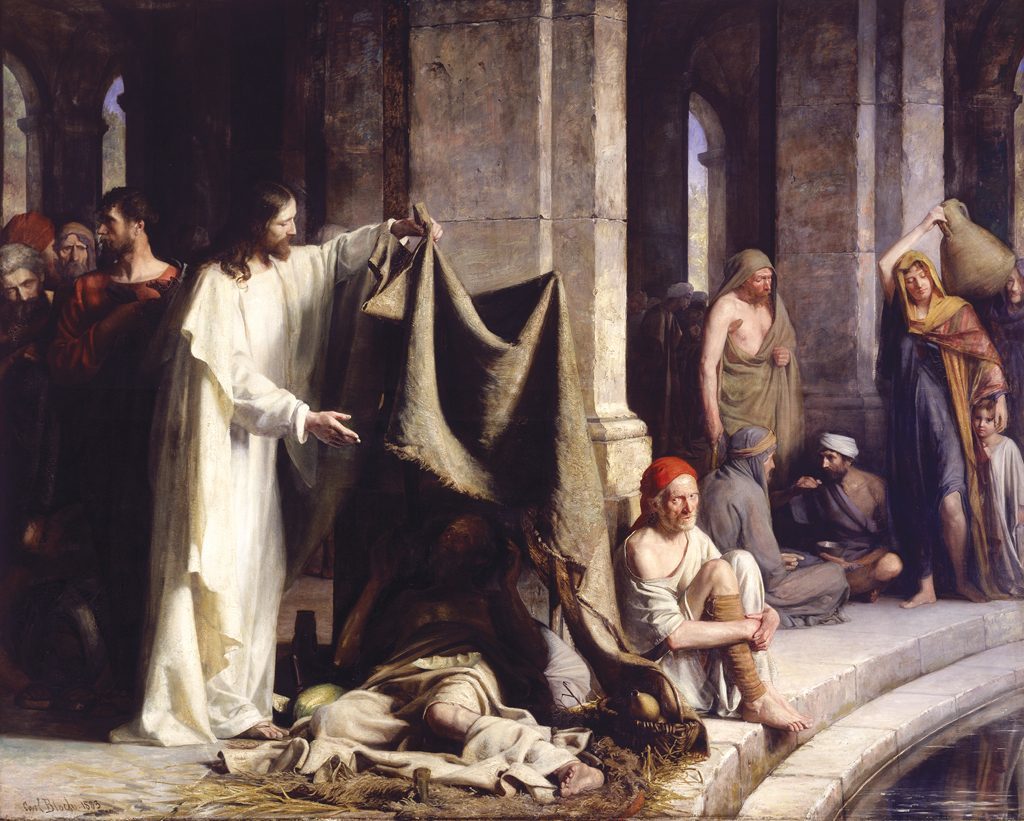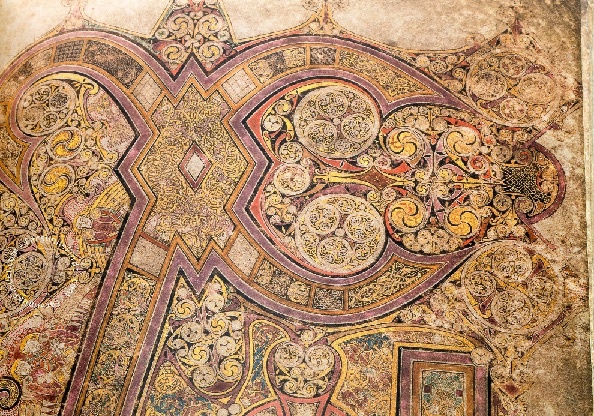
Painting by Jeff Watkins
Daniel 12:1-3
Psalm 16
Hebrews 10:11-25
Mark 13:1-8
Click here to access these readings.
We are, at last, in the final weeks of the season of Pentecost. We have only this week and next week, and next week is something special. This week is the last “normal”, green week of Pentecost. Soon we’ll be in the thick of purple for Advent. We’ll switch from reading the gospel of Mark each week and start reading the gospel of Luke. Then it will be the Christmas, then Epiphany, Lent, and Easter: those seasons where we live with the life, death, and resurrection of Jesus Christ. But for now, the season of Pentecost, which is the season of the Church, is almost over.
I’m not sure if you’ve noticed, but our readings over the past few weeks have been settling into this feeling of “being over.” We’ve been hearing the promises of the Old Testament and of Revelation, of some great End that may come with grief and anguish, but which will lead to a new beginning. We read in Hebrews this week of a change, how priests used to sacrifice every day for the people, now have given away to Christ, whose sacrifice is once and for all. The need for sacrifices is over, for Christ died on the Cross and Rose again. And this sense of “ending”, of “being over”, is mirrored in the seasons of the world, so that as the days get darker and the year draws to an end, we read from the Bible of anticipation, of waiting, and of things that are finished.
We Christians are a people of ends, but also of new beginnings. We are called to die to our sins daily, to reflect on how we have lived in the past, and to bear our own cross. Yet we are also called to new life in Christ. We are called to nurture the seeds of God within us, to pray in the Spirit, and to live lives of fullness and hope and love. We are to die, and we are to be reborn. And through these deaths and resurrections in our lives, which we experience each and every day, we are led deeper into the life of God in Jesus Christ. This is the Christian life. Our prayers nurture the Spirit within us; in the Sacraments we meet and are healed by God; and we encourage one another, in the Spirit, to a life of ministry to the sick, the lonely, and the needy of the world. And although we still sin, and sin daily, our Christian lives lead us closer and closer to God, until that last day and that final death, when Death and Sin are at last left behind and we enter into the fullness of God.
But not yet. We live in an odd sort of paradox, we Christians. Death and Sin are defeated, but we are still affected by them. As the author of the letter to the Hebrews writes, “Christ offered himself for our sins once, in a single sacrifice, for all time.” And yet, even with Sin and Death defeated, even with Christ’s great victory, we still sin. To put it another way, we Christians are an “already, but not yet” people. We are already forgiven, but we are not yet in the fullness of God. Christ has died for our sins, but we not yet free of the muck and the shadows of this world. We are an “already, but not yet” people.
I think we kinda get what this means in our daily life. Think of Christmas Eve: one of the great joys of being a parent is setting up on Christmas Eve. The gifts are out, the stockings filled, the decorations tidy and finished. Tomorrow will be Christmas, and all the gifts will be opening, and there will be joy and family and laughing, but tonight, on Christmas Eve, there is silence and stillness. The whole house is set up, ready for the kids, but not yet, not until the morning. Already, but not yet.
Or, here’s another image. A friend of mine recently posted on facebook a video of a plant growing. All the dirt was pushed up against a glass, and the seed, too, so you could see each moment. The video was in fast-forward, so you could watch as the roots stretch out into the rich soil, first one, then another, then one would split and both would reach outwards. Then the seed broke fully and the plant rose above the soil. Two little leaves sprung out and wobbled as they grew larger and larger. And at each moment, the seed was growing, and it’s growth was alive and fully, but it wasn’t yet an adult plant, not until that last moment of the video. It was already alive, but not yet fully itself. And my friend’s comment on the video was that this seemed like a good image to have stored away somewhere in the depth of one’s being.
These images, I think, do a decent job of describing the idea of “already, but not yet.” But there’s another that works better, and that’s marriage. Helene and I were married in 2010 at a really beautiful ceremony out on the Jersey coast. The wedding itself was right on the beach, facing inland, out under the sky, and all our favorite people were there. It was a truly beautiful day. Helene and I said our vows, we exchanged rings, the pastor blessed the union, and we were, in all ways, “married.” We even had this nice, complicated document from the county to prove it. And I thought, cool, I’m married now. I’m a husband. Helene is my wife. We are “married.”
And so we were. We were husband and wife that summer day in 2010 on the shores of New Jersey. But marriage both is and isn’t a one time thing. Marriage isn’t something you do and are done with, like opening a present, or baking a pie, or tying your shoes. Marriage is something you live into. Marriage is a life that challenges us, tests us, encourages us, and leads us into deeper and deeper parts of ourselves, our spouses, and, truly, God. I am married because I said “I do” to Helene (and she said it back) in a ceremony by the shore, but each day I am growing and being grown in this marriage, so that, each day, I feel more and more “married.” And, I hope, I will continue to grow in our marriage until the day I die. Will I ever be “fully” married? Will there ever come a day when I say, “Okay, I got this. Helene and I are perfect and our lives together are perfect. I’m finished. Time to put my feet up and reap the benefits of perfection.” No, there won’t be. Even with this ring, even with the words “I do,” we still have room to grow together. Already, but not yet.
This is an image of the Christian life. Like all the other sacraments, marriage is an image of our relationship with God. Christ died for our sins, once and for all, and he defeated death, once and for all – but we Christians must live into that reality. Christ has given us a most precious gift, but we must not only unwrap it but use it, live it, and grow with it. As I said, this is the same for all the sacraments. In Baptism, we are joined with God in a bond that can never be broken, but even still, we must live into that baptism and allow it to nurture and grow us into Children of God. This is why we take the Eucharist each and every week. This is why we gather together as a Church, and this is why we not only love one another but seek to nurture Christ in each and every person we meet. The work of Christ is not finished and accomplished, once and for all, so that it can be done for us, like finding some kid in school who will do your homework for a dollar, or hiring someone to clean your house so you can relax when you get home.
The work of Christ was complete, and it was fully complete, but we small little people need to enter into that fullness, to grow within it, like a little sapling in the rain and sunshine. Christ gave us a gift, and that gift is a life lived, more and more fully, to God.


